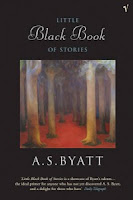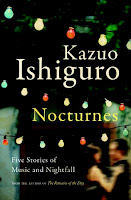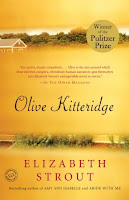 Damon Galgut has come to occupy a piece of my reading heart only formally held by Coetzee. Like Coetzee, Galgut writes with such skill and serenity that I find myself a better person for having finished one of his books. Until I discovered Galgut, I’d never read another writer who can write so simply (in terms of structure and punctuation) and yet who can still create such a compelling, moving Coetzee-like narrative. I don’t want to just compare the two or lump them together but it’s impossible not to notice the influence as you read In a Strange Room.
Damon Galgut has come to occupy a piece of my reading heart only formally held by Coetzee. Like Coetzee, Galgut writes with such skill and serenity that I find myself a better person for having finished one of his books. Until I discovered Galgut, I’d never read another writer who can write so simply (in terms of structure and punctuation) and yet who can still create such a compelling, moving Coetzee-like narrative. I don’t want to just compare the two or lump them together but it’s impossible not to notice the influence as you read In a Strange Room.
As of late, though, I haven’t been as enchanted with Coetzee’s novels, and, in fact, one of my pet peeves in books is when authors create and/or write themselves as characters (it’s the main reason why I can’t get through Beatrice and Virgil and why I’ve never read THE Paul Auster that everyone else has read). Coetzee’s been doing a lot of this lately and as such I haven’t been as enthralled to read his novels as I once was. Yet, when I got halfway through the first of the three stories contained in Galgut’s latest, Booker-shortlisted, collection, and discovered that the narrator is in fact a travelling writer named “Damon,” I kind of inwardly groaned, but I was so taken already with the story, with the setting, that I didn’t put the book down. And I am very glad that I got over my bias because Galgut’s three stories are incredible.
There’s something about landscape in this short collection that defies description — the idea of travelling, of how it leads you to become someone so much more than you are at home — and pervades the narrative throughout this book. In each tale, more lost at home than he ever is on the road, the narrator often boxes up his life for months on end and takes to the road. The settings are exotic to a Canadian girl like me — Goa, Zimbabwe, Lethoso, even Switzerland, places where the only chance I’ll probably ever get to see them is through watching The Amazing Race. But it’s the deeply personal aspect to travelling that I found so affecting throughout. It’s not a travelogue. The stories aren’t about the setting; they are simply informed by it, the dingy hotels, the hostels, the camping trips, the odd characters, the difficulties of travelling with a friend, the difficulties of travelling to unstable places, it never feels forced or fake. It never feels Hollywood. It never feels like he’s using setting to “prove” something. The places he visits are often accidental (in the middle story, “The Lover,” the narrator leaves for a two week “jaunt” to Zimbabwe and ends up in Tanzania weeks upon weeks later) and it’s this idea of happenstance, the essential inability to know what’s going to happen once you’ve put yourself decidedly out of your routine, that creates the bulk of the plot contained within the three linked stories.
Galgut switches up what I’d call perspective; in some sentences he’s using “he” to describe the main character, in other places it’s “I” — both refer to the traveller “Damon,” and as a reader, I sort of inferred that the character of “traveller” is very different from the “I” that recollects what happened upon return; two different sides of the same experience, in a way. The dual nature of the narrator, who he is at home (wondering, wandering, a little lost) and who is he on the road, willing to take risks, confident (in a way), was perpetually fascinating for me throughout all three stories. If I had to name a favourite, it would have to be “the Guardian,” for it’s sheer narrative force. I don’t want to ruin any part of the story for someone who might want to read it so I’ll just say that it’s far less about travelling than it is about friendship — the narrator takes a troubled friend to Goa and horrible things happen, and the sadness that Galgut projects even through his simple storytelling left me a little breathless by the end. Time and distance have such an affect upon tragedy — it’s an interesting perspective.
Anyway, I’m rambling. I truly hope that Emma Donoghue wins the Booker for Room. But there’s definite worth in reading the other shortlisted books too, so far, for me, I’ve enjoyed the two I’ve read immensely. Oh, and Galgut is South African, which means I can add a book to my incredibly lame, utterly failing Around the World in 52 Books list for this year. I might be at 5 or maybe 6 countries if I’m lucky. Fail!







